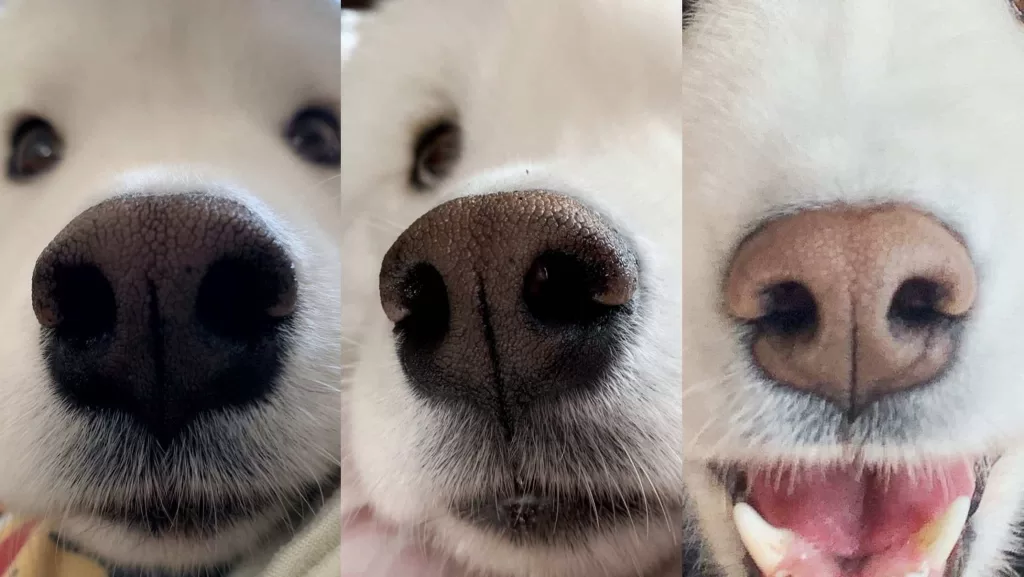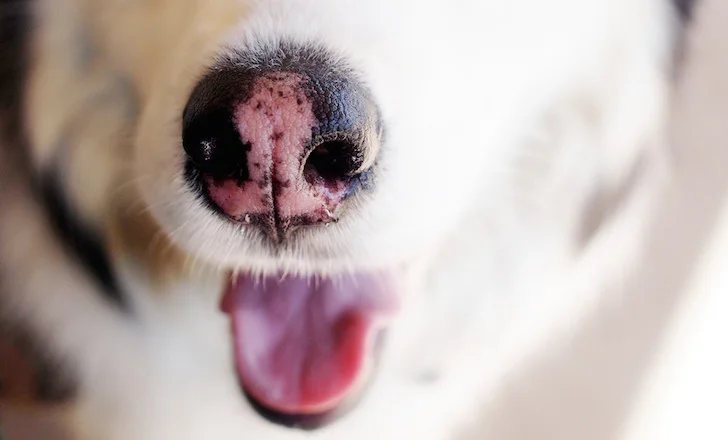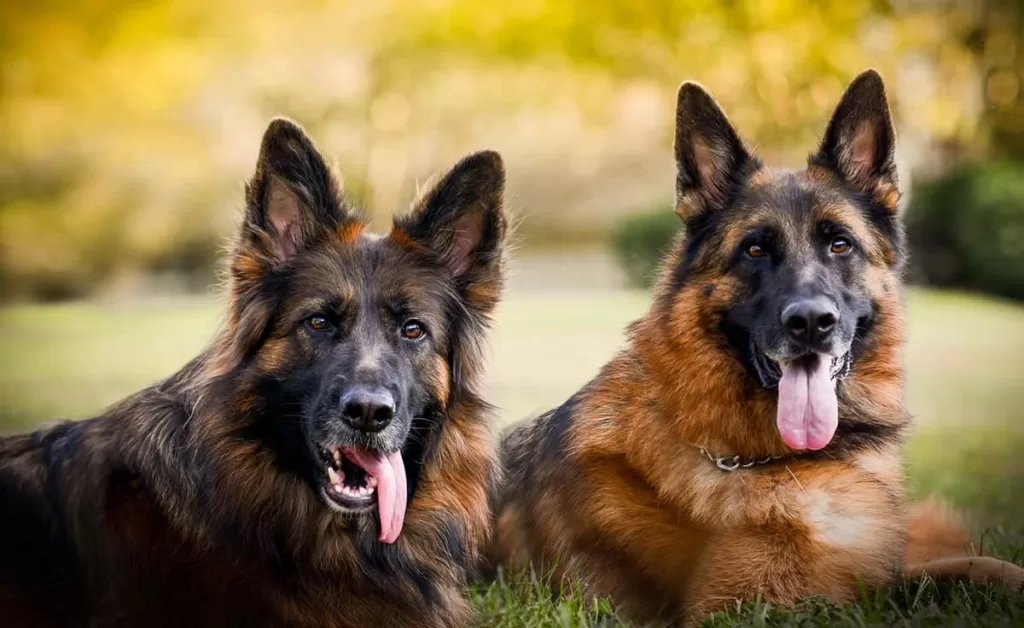Dogs with Pink Noses: A black beautiful nose is a feature of beloved dogs and it is the most common color you see.
Table of Contents
Just like different coat colors, your dog will also have different nasal tones. There are five main variations on the nose: liver (pink), dudley, butterfly as well as blue and black.

Genes directly affect the color of a dog’s nose, but pigment loss can also cause a change in color, resulting in a dudley nose.
Some dog breeds have a naturally pink nose, while some black-nosed dogs have a pale nose due to certain conditions:
- Weather
- Allergy
- Aging
- Infection
- Autoimmune disease
As mentioned earlier, the default color of the dog’s nose is black. You saw dogs with pink noses. This ispink nose is usually due to two reasons.
They usually belong to the breed of dog that has the pink nose. It is caused by genetics and is passed down from their parents.
The dog has a black nose and it has changed color. This is due to the loss of pigmentation, often referred to as the dudley nose.
This is in contrast to the snow nose, which is a seasonal phenomenon in cold weather.
Dudley nose
Dudley’s nose gradually turns light brown and pink when the dog is born with a dark black nose. In case of complete depigmentation, the nose turns pinkish white.
It should not be confused with an ice nose. This is a unique but common condition in which the dark pigment on the dog’s nose fades in winter and darkens again in spring and summer.

Complete depigmentation never occurs. Snow beaks are often found in
- Siberian Huskies
- Golden Retriever
- Labrador Retriever,
- Bernese Mountain Dogs and a few other species.
Loss of pigment is usually not dangerous. However, it does indicate an underlying problem that requires medical help. Consult your vet if you have problems.
Dogs with Pink Noses: What does it signify when a dog has a pink nose?
The color of a dog’s nose is determined by the amount of melanin present in the skin. Melanin is a pigment that gives skin, hair, and eyes their color. Dogs with black noses have a lot of melanin in their skin, while dogs with pink noses have less melanin.
Significance of a pink nose
A pink nose in a dog can be caused by a number of factors, including:
- Breed: Some dog breeds are simply more likely to have pink noses than others. For example, Labrador Retrievers, Golden Retrievers, and Dalmatians are all known for their pink noses.
- Age: Puppies often have pink noses that darken as they get older. This is because melanin production increases with age.
- Cold weather: A dog’s nose may turn pink in cold weather. This is because the cold can cause the blood vessels in the nose to constrict, which reduces blood flow to the nose and makes it appear lighter in color. This is known as “snow nose” and is usually harmless.
- Sun exposure: Too much sun exposure can cause the nose to fade and turn pink. This is why it is important to protect your dog’s nose from the sun with sunscreen or a hat.
- Allergic reaction: A dog with a pink nose may be having an allergic reaction to something, such as food, pollen, or fleas.
- Medical condition: A pink nose can also be a sign of a medical condition, such as autoimmune disease, liver disease, or cancer.
Cause for concern?
A pink nose in a dog is not usually a cause for concern. However, if your dog’s nose suddenly turns pink, or if it is accompanied by other symptoms such as swelling, discharge, or bleeding, it is important to see a veterinarian to rule out any underlying medical conditions.
There are a few reasons to lose pigment in a dog’s nose.
Ice nose. The dog’s nose is thought to be lighter in winter due to the breakdown of tyrosinase – a temperature-sensitive enzyme that causes melanin production. Melanin gives color to our hair, skin and eyes.
At the age of the dog. The enzyme tyrosinase, which produces melanin, also weakens with age.
Hence we often see a dog’s nose lose pigment and turn pink as he or she grows older.
Injury to the nose. An incision or abrasion on the nose will turn pink when it heals.
The result of infection. If the dog has a bacterial infection, it is expressed on the nose. Look for a light color along with an inflamed, crusty and unhealthy look.
If you notice these symptoms in your dog, consult a veterinarian for treatment to rule out any serious health conditions or if a problem is found.
Caused by allergies. Dogs can cause allergic reactions to the things they come in contact with. If this happens, your dog’s nose and surrounding area will look lighter and may feel inflamed or sore. Then, do some research to find out what your dog is allergic to.
Auto-immune disease is when the body attacks its own tissues. In the case of a purchased pink nose, the dog can usually turn a black nose pink because the cells that make up the melanin pigment are being destroyed.
Also Read: How much Exercise does a German Shepherd Need?
Over time, the nose gradually turns pink as the melanin cells gradually cease to have their normal black pigment. It is similar to the human condition vitiligo, in which the normal skin color slowly deteriorates.
The pink nose caused by cold weather is often found in the Siberian Husky and is called the Snow Nose. Some dogs are allergic to the chemical sometimes found in plastic food dishes.
This also causes the nose to lose pigment.
Which dog breeds typically exhibit pink noses?
The following dog breeds are known to typically exhibit pink noses:
- Labrador Retriever
- Golden Retriever
- Dalmatian
- Weimaraner
- Doberman Pinscher
- Irish Setter
- Samoyed
- Alaskan Malamute
- Siberian Husky
- Border Collie
- Australian Shepherd
- Bull Terrier
- English Springer Spaniel
- Field Spaniel
- Pointer
- Nova Scotia Duck Tolling Retriever
- Chihuahua
- Pug
- Boston Terrier
- Maltese
- Yorkshire Terrier
- Pomeranian
- Toy Poodle
- Havanese
- Cavalier King Charles Spaniel
- Shih Tzu
Some of these breeds, such as the Labrador Retriever, Golden Retriever, and Dalmatian, were originally bred for hunting or working in cold climates. It is possible that their pink noses evolved as a way to protect their noses from the cold and frostbite.
Other breeds, such as the Weimaraner, Doberman Pinscher, and Irish Setter, were bred for their appearance. Their pink noses are likely simply a result of their selective breeding.
It is important to note that not all dogs within a breed will have pink noses. There is variation within breeds, and some dogs may have black noses or noses of other colors. Additionally, puppies often have pink noses that darken as they get older.
If you are unsure whether or not your dog’s pink nose is normal, it is always best to consult with a veterinarian.
Exceptions and variations
There are a few exceptions to the general rule that the breeds listed above typically have pink noses. For example, some Labrador Retrievers and Golden Retrievers may have black noses. Additionally, some Dalmatians may have black noses or black spots on their noses.
It is also important to note that some dogs may develop pink noses later in life. This can be caused by a number of factors, such as age, sun exposure, or allergies. If your dog’s nose suddenly turns pink, it is important to see a veterinarian to rule out any underlying medical conditions.
Which dog breeds are known for having red noses?
Several dog breeds are known for having red noses, a distinctive trait that sets them apart from dogs with more common black or brown noses. These breeds are recognized for their unique appearance and are often cherished by enthusiasts. Some of the prominent dog breeds known for their red noses include:
- Irish Setter: Irish Setters are renowned for their striking red coat, and this breed typically sports a matching red nose. Their beautiful auburn coat and nose make them easily recognizable.
- American Pit Bull Terrier: While not all American Pit Bull Terriers have red noses, it is a common trait in this breed. The “Red Nose” Pit Bull is a specific bloodline known for its distinctive red nose and coat color.
- Staffordshire Bull Terrier: Staffordshire Bull Terriers, often referred to as “Staffies,” can have red noses, which complement their muscular build and energetic nature.
- American Bulldog: Some American Bulldogs exhibit red noses as part of their genetic makeup. These dogs are known for their strength and loyalty.
- Rhodesian Ridgeback: Although the Rhodesian Ridgeback’s coat is typically a reddish-brown color, some individuals may also have a red nose. These dogs are originally from southern Africa and are known for their hunting abilities.
- Plott Hound: Plott Hounds, known for their excellent tracking skills, can have red noses. They are a breed of coonhound originally developed for boar hunting.
It’s important to note that while these breeds are known for their red noses, not all individuals within these breeds will exhibit this trait. Nose color can vary even within a specific breed, and it is just one of many factors contributing to a dog’s unique appearance. Additionally, the red nose trait is typically a cosmetic characteristic and does not impact a dog’s health or behavior.
Remember that when choosing a dog, it’s crucial to prioritize the dog’s temperament, care requirements, and compatibility with your lifestyle over their nose color or appearance.

